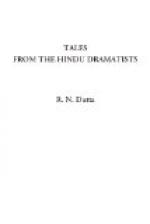“Whoever confident in arms is ranked amongst the adverse host—whomever the race of proud Panchala numbers, active youth, weak age or unborn babes, whoever beheld my father’s murder, or whoever dares to cross my path, shall fall before my vengeance. Dark is my sight with rage, and Death himself, the world’s destroyer, should not escape my fury.”
Kripa then requests Duryodhana to give the command of the army to Aswatthama. The king excuses himself on the plea of having promised it to Kerna, to whom he transfers his ring accordingly. A violent quarrel ensues between Kerna and Aswatthama, and Duryodhana and Kripa have some difficulty in preventing them from single combat. Fiery Aswatthama at last reproaches Duryodhana with partiality, and refuses to fight for him more. Bhima proclaims that he has at last encountered Duhsasana, the insulter of Draupadi, and is about to sacrifice him to his vengeance. Kerna, instigated by Aswatthama, foregoes his anger and is about to resume his arms when a voice from heaven prevents him. He is obliged, therefore, to remain an idle spectator of the fight, but desires Kripa to assist the king. They go off to fight.
Duhsasana is killed and the army of the Kauravas is put to the rout. Duryodhana is wounded and becomes insensible. On his recovery, he hears of Duhsasana’s death and gives vent to his sorrows.
In the conflict between Arjuna and Vrishasena, the son of Kerna, the young prince is slain to his father’s distress. Sundaraka, a follower of Kerna, brings a leaf on which Kerna has written to Duryodhana, with an arrow dipped in his own blood, message for aid. Duryodhana orders his chariot, and prepares to seek the fight again, when he is prevented by the arrival of his parents, Dhritarashtra and Gandhari, who with Sanjaya, endeavour to prevail upon Duryodhana to sue for peace, but he refuses.
A tumult and the entrance of the king’s charioteer announce the death of Kerna. Duryodhana, after expressing his grief, determines to go and avenge him, and mount the car of Sanjaya, the charioteer of Dhritarashtra, for that purpose, when Arjuna and Bhima arrive in search of him.
On finding the seniors there, Arjuna purposes to withdraw; but Bhima insists on first addressing them, which they do, but in insulting terms.
Dhritarashtra, reproaching them for this language, is told they use it not in pride, but in requital of his having witnessed, without interfering to prevent, the oppression and barbarous treatment the Pandavas experienced from his sons. Duryodhana interferes and defies Bhima, who is equally anxious for the combat; but Arjuna prevents it, and the brothers are called off by a summons from Yudhishthira, who orders the battle to cease for the day and the dead bodies of either party to be burnt. Aswatthama is now disposed to be reconciled to Duryodhana; but the prince receives his advances coldly, and he withdraws in disgust. Dhritarashtra sends Sanjaya after him to persuade him to overlook Duryodhana’s conduct. Duryodhana mounts his car, and the aged couple seek the tent of Salya, the king of Madra.




